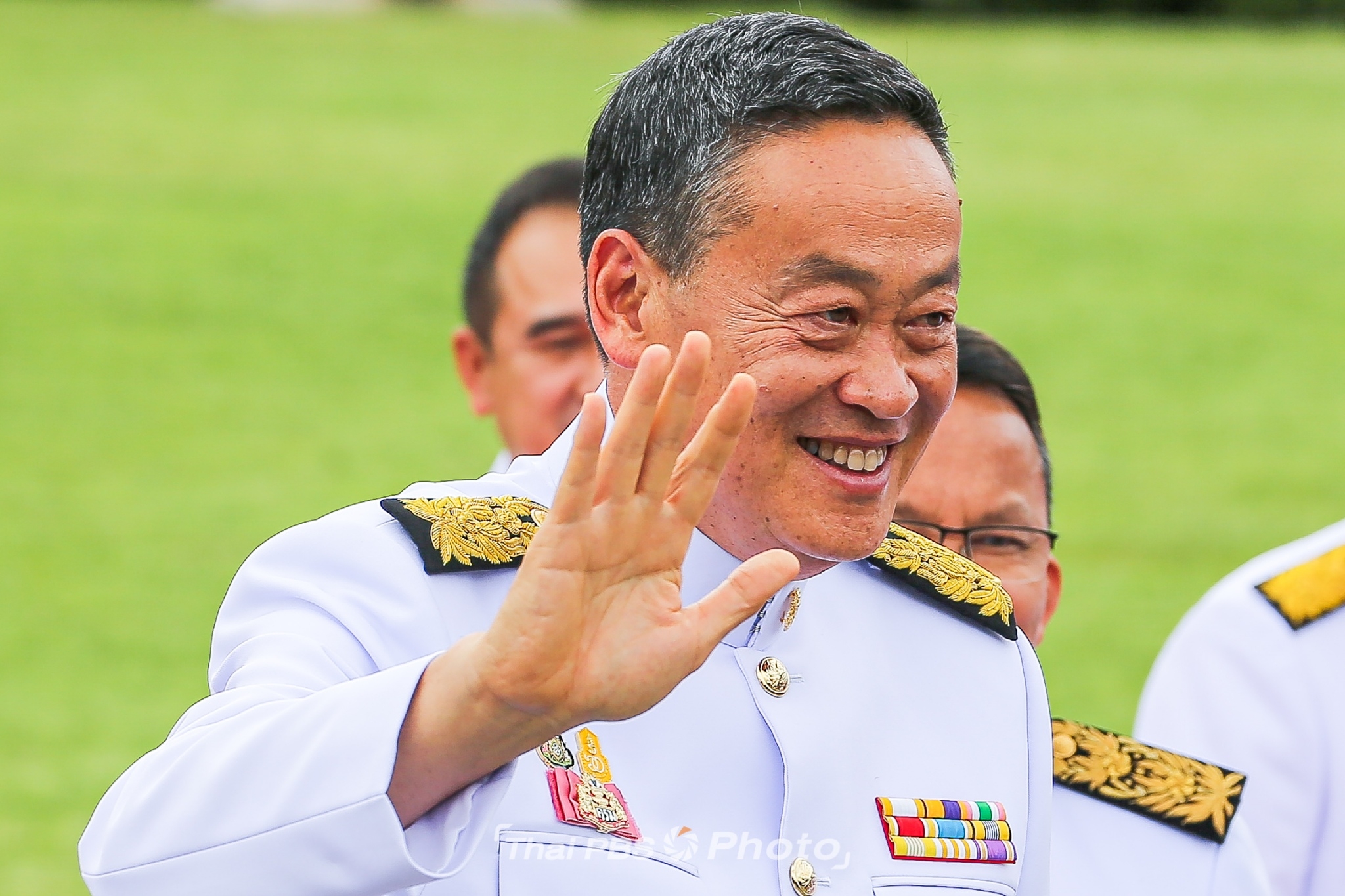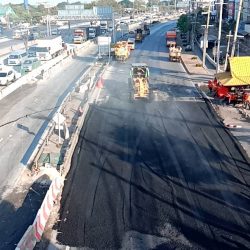Srettha’s zealous diplomatic outreach to secure investments yet to bear fruit

Prime Minister Srettha Thavisin has set a record for the most number of foreign trips by a premier in just four months in office, but he has little to show for it in terms of economic dividends for the country.
Branding himself as the chief salesman of Thailand, Srettha said in early December that his government’s goal was to bring capital and technology to the country, to shake up an economy that has been sluggish for nearly a decade.
He said that Thailand was invisible in international economic forums over the past few years, and the country had failed to achieve any new trade pacts, singling out its failure to strike bilateral free trade agreements that would help the economy.
Srettha has visited 10 countries within four months of taking office in early September. He has met most of the major world leaders, including United States President Joe Biden, China’s President Xi Jinping, Japanese Prime Minister Fumio Kishida, and Russian President Vladimir Putin.
The prime minister visited the US twice, the first time for the United Nations General Assembly in September and again for the Asia Pacific Economic Cooperation (APEC) Summit in November.
He also met chief executive officers and senior executives of many giant corporations like Tesla, Google, Microsoft, JP Morgan, and BlackRock, expressing his hope to receive billions of US dollars in investment from them.
Srettha said recently that Tesla was mulling huge investments in Thailand and was looking for a 2,000-rai (790.70 acres) plot of land for its plant in Thailand. The company’s plan was likely bigger than an assembly line for electric vehicles and could be a part of Tesla’s supply chain in Southeast Asia, he said.
Ambitious land bridge
Srettha also wants to capitalize on Thailand’s strategic geographical location to generate growth by proposing the old idea of a land bridge project as a shipping shortcut between the Indian and Pacific oceans.
Initiated in the late 1980s, the government planned to invest 1 trillion baht in ports in Ranong in the Andaman Sea and Chumphon in the Gulf of Thailand as well as a 90-kilometre transportation route to link to the two ports. This would create an alternative route to the shipping line via the busy Malacca Straits and Singapore ports.
Srettha launched a series of roadshows about the project at every international forum he attended, beginning with the Belt and Road Forum for International Cooperation in Beijing in October, at the ASEAN-Gulf Cooperation Council meeting in Riyadh a few days later, at the APEC Summit in San Francisco in November, and in Tokyo when he attended the ASEAN-Japan summit in the middle of December.
The new route could reduce transportation costs by 15 per cent. It would be a lot more beneficial to the Thai economy. The land bridge is expected to bring 1.3 trillion baht in benefits to the economy, raising the country’s gross domestic product rate by 1.5 per cent per annum by increasing exports and creating 280,000 jobs, according to Srettha’s presentations.
Transport Minister Suriya Juangroongruangkit said that at least 10 US firms had shown interest in the project. A government spokesman, Chai Wacharonke, said Chinese companies, including China Harbor Engineering, were also interested in the mega-project.
Feasibility issues
However, domestic and international analysts doubted if the high-cost project would be viable for business and worth such a huge investment. An observer said it might be inconvenient and costly to unload containers from a ship and load them again on trains or trucks carrying them for nearly 100 kilometers over land before loading them into another ship.
China strategically eyed a canal at Kra Isthmus to link the Indian and Pacific Oceans as a real shortcut to the shipping line, but none of the Thai governments dared to tear the land apart.
None of the American, Chinese, and Japanese firms made any direct comments about the land bridge project. Residents in areas have expressed their concern about the social and environmental impact.
More trade with close neighbors
In 2024, Srettha’s government has planned two joint cabinet meetings — with neighboring Cambodia in February and Vietnam in May — to forge cooperation for mutual economic benefit, according to government officials.
Srettha said he would discuss maritime cooperation to extract natural gas in the 26,000-square-kilometer area in the Gulf of Thailand over which both countries have overlapping claims. His Cambodian counterpart Hun Manet is expected to visit Thailand for the joint cabinet meeting.
The two countries had signed a memorandum of understanding in 2001 to negotiate sea boundary disputes, but political strife in Thailand as well as a border spat over the Hindu temple of Preah Vihear over the past decades blocked any progress in the talks.
Improved ties over the past years and a shortage of gas supply would enable the two governments to put the issue on the table again, according to the source.
Cross-border trade would also be high on the agenda during the Thai-Cambodian joint cabinet meeting. The two premiers vowed when Srettha visited Phnom Penh in September to increase bilateral trade to US$15 billion by 2025.
The planned joint cabinet meeting with Vietnam would upgrade bilateral relations between the two countries to a comprehensive strategic partnership, according to government spokesman Chai.
The two countries would reduce barriers and facilitate trade between each other in a bid to reach the target of US$25 billion by 2025.
Srettha promised his Lao counterpart Sonexay Siphandone when he visited Vientiane in late October to enhance economic cooperation, and boost bilateral trade to US$11 billion by 2025. He said Thailand preferred purchasing all clean energy from Laos to allow the land-locked neighbor to utilize the Thai grid system to transfer electricity to competitor Singapore.
Diplomatic blunders
As a newcomer to politics, Prime Minister Srettha also learned some bitter lessons in diplomacy. He was criticized for making a diplomatic blunder when he rushed to tweet his condemnation of the brutal raids on Israel on October 7.
The Thai PM did not specifically mention Hamas, but the insinuation was clear as he cited the attack “…from Gaza Strip to target Israel on October 7, 2023. The Thai Govt & I extend my deepest condolences to the Government and the people of the State of Israel.”
“We strongly condemn this attack, which has tragically resulted in the loss of innocent lives and injury to civilians,” he tweeted.
The Foreign Ministry needed to adjust the statement in a more diplomatic way saying that “the Royal Thai Government wishes to express our deepest condolences to the Government and people of Israel on the unfortunate loss of lives and injuries from this inhumane and indiscriminate act.”
Thailand has diplomatic relations with Israel but cannot be indifferent to Palestinian sensitivities as Hamas held 32 Thai nationals as hostages in Gaza. Srettha’s government needed assistance from Hamas-friendly countries including Malaysia, Iran, and Egypt to secure their release.
Another blunder happened when authorities handed out T-shirts with Thai and Israeli national flags to the returnees rescued from the violence in Gaza to praise the friendship with Israel, but it disappointed those who had helped secure the release of the Thai hostages and Hamas.
As of December 15, the fate of the remaining eight Thai hostages was unclear, a diplomatic source said.
By Thai PBS World’s Political Desk






